What is the difference between cooking with olive oil and with vegetable oil?
Find out what oil is a good choice for high heat cooking, which is better for baking, and more.
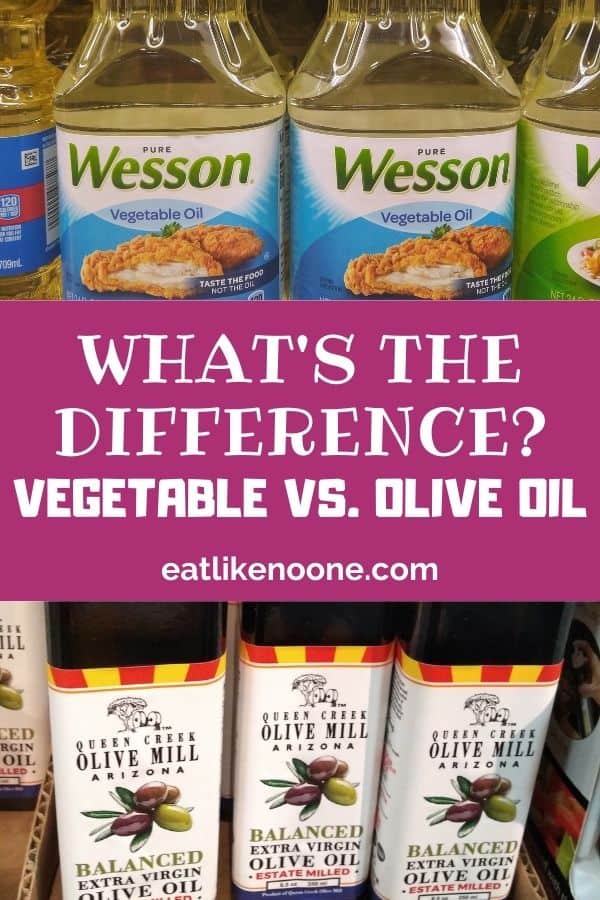
Two of the most popular types of cooking oils are vegetable and olive. But have you ever struggled with trying to decided which to use? And for what purpose?
We are going to explore the main differences between olive oil and vegetable oil and give you tips for knowing when to use what.
Jump to:
🥊 Vegetable vs. Olive
We are providing out with this handy chart below to look at how these two types of oils differ. When we say vegetable oil that means the oil is labelled "vegetable oil". There are plenty of other oils that are made from vegetables like corn oil.
| Vegetable | Olive |
| Neutral flavor | Distinct flavor varying from rich to light |
| Made from vegetables - nearly always all soybean | Made from fruit - olives |
| High smoke point - 400°F-450°F | Low to high smoke point - Varies from 325°F-465°F |
| Very limited choices | Lots of choices |
| Does not solidify in the fridge | Can solidify in the fridge and turn cloudy |
| High in polyunsaturated fats | High in monounsaturated fats |
| Contains vitamin E | Contains vitamin E |
The most simple way to describe the difference is flavor. Vegetable oils have little to no flavor, while olive oil can be mild to very robust in flavor. In most cases where you are using olive oil you are going to taste the oil.
Flavor aside, here are some other things to consider when choosing which to use.
🌡️ High Temperatures
I would say most people probably use oil the most when cooking. We are probably talking high temperature cooking. When we start talking about cooking with a heat source that is over 350 degrees, it's time to consider the smoke point of your oil.
Smoke point is simply the point at which the oil starts smoking, which is the first step towards burning.
Vegetable oil has a higher smoke point in general. It's better for cooking methods like deep frying. However if you are talking about "regular olive oil" which would called a refined or light olive oil than it will have a higher smoke point. Extra-virgin olive oil has a low smoke point.
You can choose a refined or light olive oil for frying. I typically don't make that choice because the vegetable oil is cheaper and you often are using an entire container. If I am doing a pan fry where I only need a couple inches of oil in the pan (like I do for fried fish) than I might choose a light olive oil.
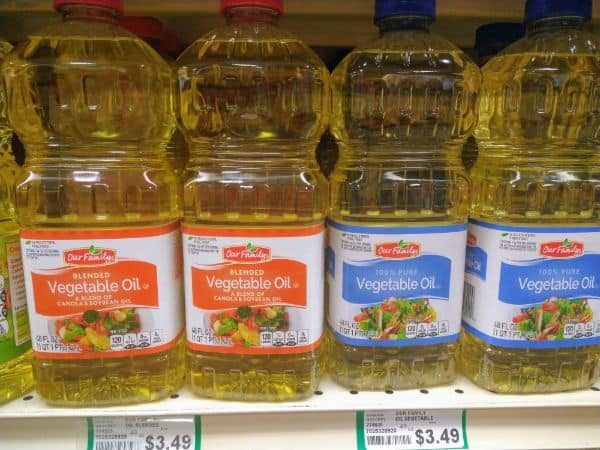
🛢️ Types of Vegetable Oil
You don't have a lot of choices in this department. I recently searched over the grocery store shelves to see what I could find. Most stores carry a 100% pure vegetable oil or a blended mix.
Q: What is 100% pure vegetable oil? A: Soybean oil.
Might as well call it that as it's very hard to find a vegetable oil that isn't all soy. I use to think with a name like vegetable oil that means the oil comes from multiple different plant sources.
But if you are buying a blended mix then it's most likely soybean oil mixed with canola oil.
I did find a vegetable oil on the market that is different. Check this one out:
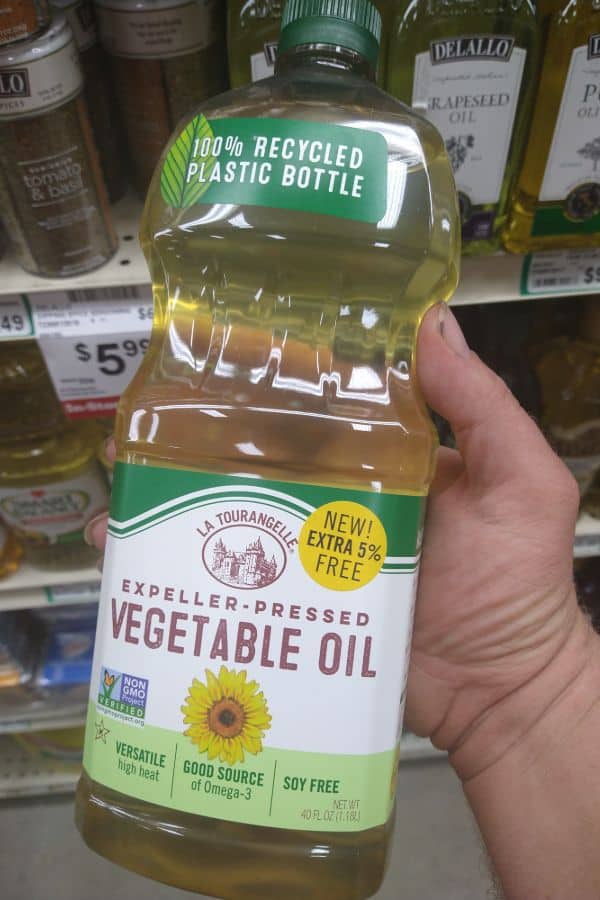
It is a more expensive oil, but it's the only vegetable oil I found that I could recommend. It's a combination of canola and sunflower oil. It's Non-GMO Project Verified. The claim on the label is that it's a good source of omega-3 fatty acids.
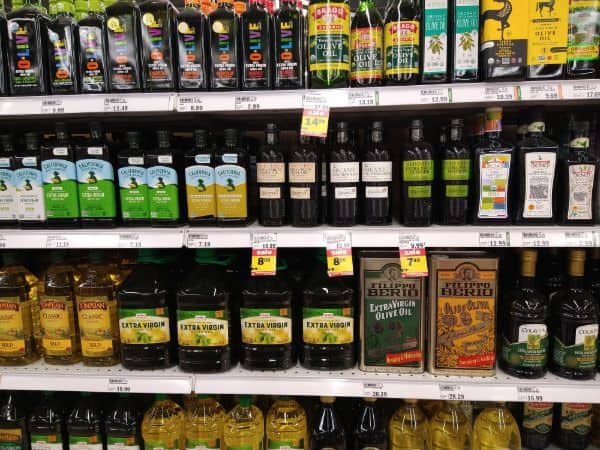
🕊️ Types of Olive Oil
In contrast to vegetable oil options, when it comes to olive oil, the sky is the limit. Stores often have oil sections, and then a separate olive oil section.
To simplify things, you are deciding whether you want extra virgin or not. If flavor is most important to you than you will pick an extra virgin. If smoke point is a deciding factor or you want to just subtitle for vegetable oil, than you want a refined or light olive oil.
Even among extra virgin oils there will be different choices. When I visited Queen Creek Olive Mill in Arizona I picked up a bottle of Balanced Extra Virgin Olive Oil and a bottle of Robust Extra Virgin Olive Oil.
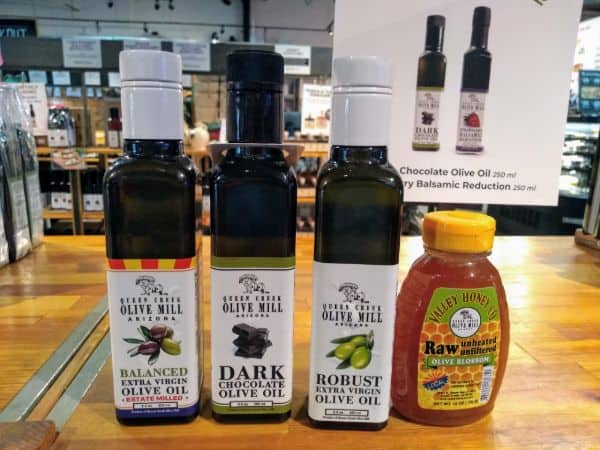
🍳 Culinary Use
Let's take a look at the different culinary uses and whether you want to choose vegetable or olive oil.
Salad Dressings
Olive oil will add a ton of flavor to your salad dressings, sometimes it can overpower it, so you might want to factor that in.
Neither oil is a solid at room temperature like coconut oil, but olive oil could solidify in the fridge. Keep that in mind when dressings with it as olive oil dressings can be hard to use straight from the fridge.
I like to make a salad dressing using toasted sesame oil that has a strong flavor. With something like that I would mix in a neutral oil like vegetable, but more often I use grape seed.
🥗 RELATED - How to Make Simple Homemade Salad Dressings
Baking
Just like with dressings you need to consider flavor when it comes to using olive oil over vegetable in baking. It can effect the final flavor of the baked good.
Olive oil can be delightful when you are making an olive oil cake. I normally would opt for the natural vegetable oil in things like brownies. However I do have a chocolate olive oil that might be tasty in brownies.
Meat
For meat, I am talking about what oil to use when cooking it in a pan.
This category can be a toss-up. You can go either way, it's your preference.
If I want that olive flavor, than I will cook the meat at a temperature that isn't too high that the oil smokes.
Frying
Making homemade French fries, go with a refined or light olive oil or vegetable oil. Extra virgin would smoke and I think the flavor might be a bit strong for my liking. There are plenty of other oils you can use for deep frying as well like peanut oil, canola oil, or grapeseed oil.
📦 Storage
You don't need to store either oil in the fridge. The best place for them is at a room temperature spot in a dark place. Light is not a friend of oils, especially the ones that are minimally processed or unrefined.
It may be tempting to keep your oil out because you have a beautiful container you use for it, but it's best living in your pantry or cabinets. One grocery store that was is now of business use to store their oils in the windows. It looked pretty up there but wasn't the right thing for the oils. Must not have sold enough of them as there closed down.
🙋 Can You Mix Vegetable & Olive Oil?
What if you want to mix together the two oils? Is that a good idea? Here are some reasons you might consider this.
- You are low on one of the oils and need to supplement.
- You want to use olive oil but it's too strong for your taste, so you add the blander vegetable oil.
- You are trying to strench your olive oil further as it's more expensive.
I don't mix oils myself very much but these reasons are all valid ones.
Keep in mind if you mix oils, they have different smoke points. You will need to be aware of the oil with the lower smoke point.
➕ More What's the Difference Posts
Learn about the differences between these other foods.


Leave a Reply